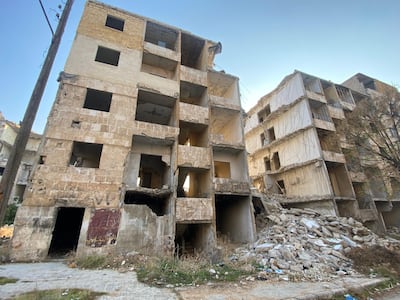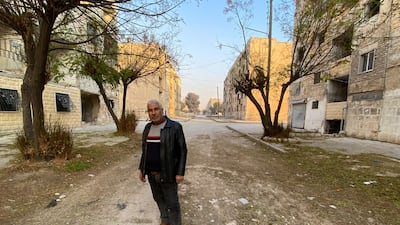Live updates: Follow the latest on Syria
The strange silence that hangs in the foggy air is the first thing that strikes a visitor to the Hanano district of eastern Aleppo, once the largest city in Syria.
Street after street, apartment blocks stand like abandoned monuments to a place that once was. Buildings have been bombed and stripped by thieves of anything worth selling, their occupants having fled and only a fraction having returned. Block after block has been pancaked by air strikes. Many of the buildings still standing have gaping holes in their walls, likely from tank shells or other heavy artillery.
While much of the rest of Aleppo is alive, with residents cautiously optimistic about the future after the overthrow of president Bashar Al Assad, districts in eastern Aleppo are a map of ruin. Those daring to return here are stalked by severe poverty and the fear that the few belongings they have left might be stolen. They also face a near-total lack of basic services such as water and electricity.
Mahmoud Al Hamidi, 70, returned to Aleppo in 2020 from Lebanon, from where he was driven out by the economic crisis and instability following anti-government protests across the country.
He found rubble piled up to knee height outside his home, an apartment on the ground floor in a block of 10 flats. Thieves had taken his refrigerator, blankets and anything else they could find.
“The most significant issue now is the security situation, the theft. I would go to stay with my daughter, she has a nice house, but I'm staying here because of the thieves,” Mr Al Hamidi told The National. “We feel so depressed. Our souls are dead.”
Eastern Aleppo came under siege by Mr Al Assad's army and allied Iran-backed militias in 2016, backed by Russian air power, as they attempted to oust rebels who had seized the area from the former Syrian president's control four years earlier. Opposition fighters and many of the residents were eventually placed on buses to the rebel-held province of Idlib, bordering Turkey, under a deal brokered by Moscow and Ankara, leaving Mr Al Assad in charge of eastern Aleppo again.
That changed last month when rebels led by former Al Qaeda affiliate Hayat Tahrir Al Sham stormed into Aleppo, the first major urban centre to fall on their march to Damascus, which they took control of days later on December 8. Mr Al Assad fled on a plane to Russia hours earlier, ending more than 50 years of his family's rule in Syria.
Residents of eastern Aleppo told The National that in the eight years after 2016, Mr Al Assad did little to restore their districts, which were associated with rebels due to their former control of the area. Charities carried out minor repairs to some buildings, including to doors and windows, they said. Estimates of the extent of damage are hard to come by, but a 2016 report by the United Nations Satellite Centre said 40 per cent of buildings in 19 districts − a total of 33,500 structures − had suffered damage.
Mr Al Assad did not carry out repairs “in order to kill his people, for the regime's own sake,” said Ammar Barakat, 40, who returned from five years' exile in Turkey when his mother Widad, 62, fell ill in 2019. The mother and son described how their homes were looted about a month ago, with the thieves taking wires and any other metal they could find.
They complained to the regime's security troops, who did nothing, they said. “The reason? They were working together,” said Mr Barakat, an industrial worker. “There was so much corruption.”
Now they have metal doors at the entrances to their homes, which they lock at night in the hope of deterring more break-ins.
Their homes were also damaged in the devastating twin earthquakes that hit Turkey and northern Syria in February last year. Mr Barakat's mother pointed to a block-long crack between the building and the pavement. “That was not here before the earthquake,” she said.

In the neighbouring street, a small medical clinic next to Mr Al Hamidi's home has been ransacked four times, according to the couple who run it – Mohammed Al Alloush, 34, and his wife Manar Tinbi, 31. The most recent incident was at about 2am on Wednesday, they said, when thieves took sterilisation equipment and an imaging machine worth $5,000 as well as a laptop, power banks and a computer monitor.
“We worked hard for years to build this clinic now we have to start from zero again,” Mr Al Alloush said as he walked through the darkened rooms of his clinic.
“We set up the clinic here because it's an area that needed it, but all our stuff has been stolen,” his wife said with a sigh.
Mr Al Alloush's father, Hassan, a retired municipality worker, said they filed a complaint with security troops from the new HTS-run authorities, who appeared to be overstretched and more focused on districts closer to the city centre.
Mr Al Hamidi said the area has no light at night after a solar street lamp was stolen about 10 days ago. He laughed at the suggestion of electricity in his home.
“There is almost none in the whole area,” he said.
Living on just 200,000 Syrian pounds (about $12) a month, mostly handouts from one of his three children, Mr Al Hamidi in any case cannot afford to pay the minimum 60,000-pound-a-week charge for electricity, or fund repairs to his home.
With electricity cuts throttling Aleppo's manufacturing sites, residents of Syria's industrial heartland are struggling to survive. Mr Barakat said he has been out of work since the rebels took over because damage to the industrial area during clashes with regime forces was still being repaired.
Even before then, providing for his wife and three children on a wage of 700,000 pounds a week was a struggle.
The cost of essentials in Aleppo has soared since the regime gained full control, reflecting the wider situation across Syria; more than 90 per cent of Syrians live below the poverty line, according to the UN.
Across the city, beggars wander the streets asking for food and money, and while the markets are full of fresh produce, many cannot afford to buy basics. People cluster around a lorry bearing Turkish writing from which packets of flatbread are being handed out.
Mr Al Hamidi, looking back at the shell of his home, feels overwhelmed by the scale of the challenges facing him, his city, and his country.
“There is no hope of being able to enjoy life,” he said. “We've gone back 70 or 80 years."


